Under the Gambling Act and the supervision of local councils, there are heavy restrictions on the way in which gaming machines must be managed.
City and regional councils across New Zealand have adopted ‘sinking lid’ policies to both venues and gaming machines. This means that if an existing Class 4 venue closes, the Council will not give consent for another to be established. It also means that a venue cannot increase its number of gaming machines, and that if a venue's license conditions change to reduce the maximum number of machines that it can operate, then it cannot apply to increase this number again at a later date.
A similar measure was proposed by the Tauranga City Council's Community and Culture Committee at the end of last year. It was met with opposition and a call to maintain the status quo.
"Reducing venues and machine numbers would merely reduce community funding and encourage more people to gamble online with zero return to the community,” said Martin Bradley from the Grassroots Trust, which operates 36 machines in two venues in the city. The Trust distributed $1.34 million of grants to local organisations last year.
The gaming industry also received support from the charities which it funds.
“Your proposed policy changes will result in a gap in services available to vulnerable people in our community,” Headway Brain Injury Association representatives Dianne Beveridge and Andrew Buckley told the committee. “Taking away this funding would be catastrophic for our clients who are already facing huge challenges in their lives.”
The Bay of Plenty Rugby Union said that the proposal would be “profoundly damaging” on the parts of the community which relied on these funds. The BoPRU received $1.4 million from gaming trusts last year.
However, the Council went ahead with the policy, meaning that no new gambling venues will be allowed to set up in Tauranga, and no additional machines will get approval to operate.
“The main issue we’re grappling with is the effect the sinking lid could have on the funding available to our community organisations,” said committee chair Terry Molloy. “We need to look into how we can help mitigate this, if the available funding does decline.”
A policy review will take place in 2022, at which time council staff will further investigate the effects of the policy on funding for community organisations.






